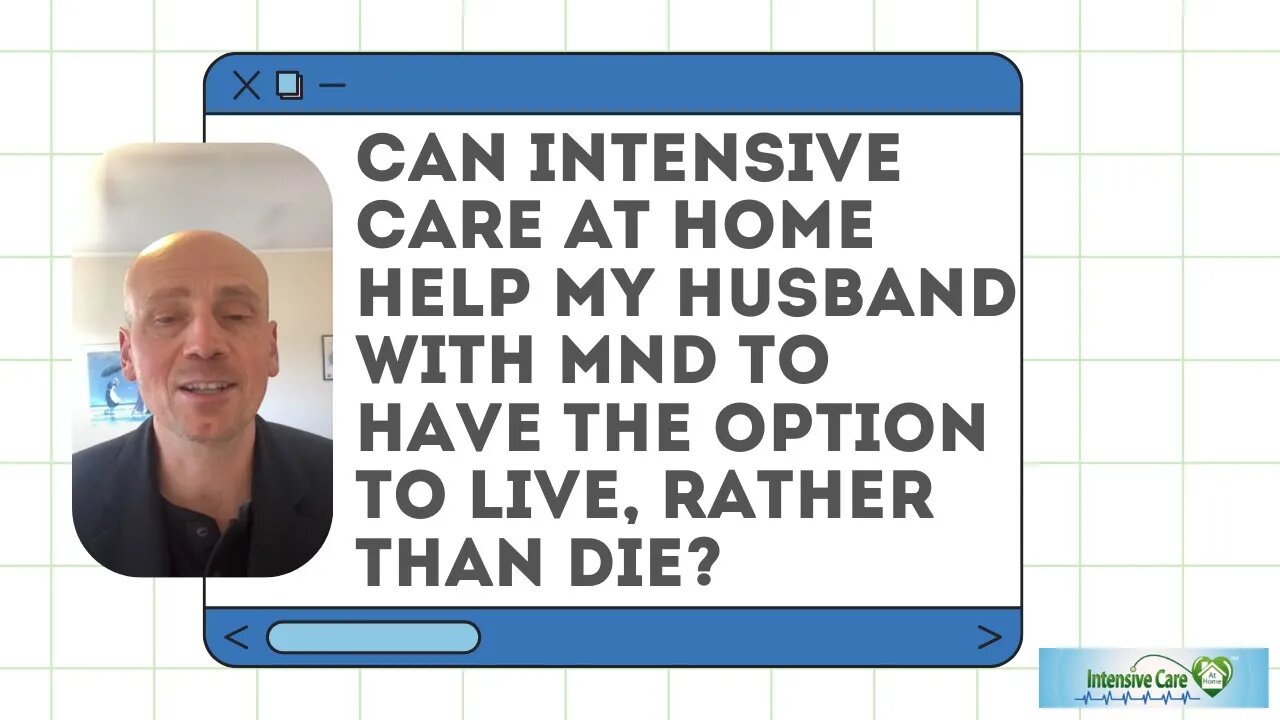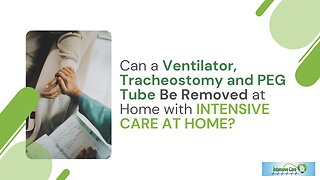Premium Only Content

CAN INTENSIVE CARE AT HOME HELP MY HUSBAND WITH MND TO HAVE THE OPTION TO LIVE, RATHER THAN DIE?
CAN YOUR SERVICES AT INTENSIVE CARE AT HOME HELP MY HUSBAND WITH END-STAGE MOTOR NEURON DISEASE TO HAVE THE OPTION TO LIVE, RATHER THAN HELPING HIM DIE COMFORTABLY?
Book your free 15-minute phone consultation here
http://intensivecarehotline.com/scheduling-appointment/
Call directly 24/7
+1 415-915-0090 USA/Canada
+44 118 324 3018 UK
+6141 094 2230 Australia
Email support@intensivecarehotline.com
Get 1:1 consulting and advocacy
1:1 phone counselling
http://intensivecarehotline.com/one-on-one-counselling/
Become a member for families of critically ill Patients in Intensive Care
https://intensivecarehotline.com/intensivecaresupport-org-membership/
Immediate action steps http://intensivecarehotline.com/take-control-take-charge/immediate-action-steps/
https://intensivecareathome.com
And if you need a medical record review, click on the link and we can help you with reviewing your loved one’s medical records while they’re in ICU.
https://intensivecarehotline.thrivecart.com/review-of-medical-records/
Facebook Page: https://www.facebook.com/ICUhotline
Twitter: https://twitter.com/icuhotline
#icu
#intensivecare
#criticalcare
In today’s blog post, I want to answer a question from one of our clients and the question today is
Can your Services at Intensive Care at Home Help My Husband with End-Stage Motor Neuron Disease to Have the Option to Live, Rather than Helping Him Die Comfortably?
Hi Patrik,
I am very interested in your blog and service. My husband has end-stage motor neuron disease and is on non-invasive (NIV) BiPAP ventilation. I have tried to explore the option of tracheostomy with a medical professional as an option, or when we feel the non-invasive (NIV) BiPAP is no longer supporting him well enough, but have been met with limited evidence-based advice and/or resistance.
We want to prepare for this option as a possibility, but for motor neuron disease patients, it is not commonly offered, which we have found very distressing. When it is brought up with the medical professional, it is very clear that it is not a pathway at present in Australia. And it’s also clear that people are not comfortable discussing it, however they are comfortable discussing palliative care.
For end-stage MND, which again stands for motor neuron disease patients, the options seem only to be, “How can we help you to die comfortably?” rather than, “What options do you have to live?” if that is your choice. My husband has a good quality of life despite being completely dependent. This should be a choice that we can make and we want to make an educated decision about it.
We are NDIS funded and we are in Melbourne Australia. I would very much appreciate knowing more about your service and what is involved and how we go about exploring this option. We really hope you might be able to assist us.
From Sharon
Hi Sharon,
What a great question and I’m very sorry to hear about your husband’s situation. Well, few explorations here, Sharon. We are looking currently after patients with motor neuron disease (MND) at home. They have tracheostomies and they’re looked after with critical care nurses, 24 hours a day funded by the NDIS.
Now, I wholeheartedly agree with you that they shouldn’t be discussing palliative care with you. They should be discussing maximizing quality of life, or in some instances, quality of end-of-life at home for people who want to live with a tracheostomy.
Now, as you’re probably well aware, they are comfortable discussing palliative care, but they’re not comfortable discussing quality of life. It’s a joke, quite frankly. Now, if you look at this situation in Europe for example, Germany in particular, patients with MND (motor neuron disease) have been getting tracheostomies for decades and they’re living at home, or people who want to live at home with Intensive Care at Home services. It’s a no brainer and it’s a choice...
-
 11:36
11:36
Intensive Care at Home
17 days agoCan a Ventilator, Tracheostomy and PEG Tube Be Removed at Home with INTENSIVE CARE AT HOME?
91 -
 LIVE
LIVE
Scammer Payback
1 hour agoTrying to Make Scammers mad LIVE
396 watching -
 1:04:50
1:04:50
The Rubin Report
2 hours agoCo-Host Stunned as Adam Carolla Gives a Brutal Unhinged Message to Democrats
37.1K13 -
 1:17:07
1:17:07
Russell Brand
3 hours agoBREAK BREAD EP. 10 - DALLAS JENKINS
54.3K3 -
 LIVE
LIVE
Benny Johnson
4 hours ago🚨Pete Hegseth Confirmation LIVE NOW as THOUSANDS Of Vets Show Support at Capitol | Trump CHEERS On
23,470 watching -
 1:33:12
1:33:12
Graham Allen
5 hours agoBiden is SABOTAGING Trump!! Says: “Our Economy Is Strong” + Elon Is Buying TikTok?!
81.7K33 -
 2:58:02
2:58:02
Matt Kohrs
14 hours agoPPI Inflation Report: Stocks Rip Higher (DJT, NVDA & TSLA) || The MK Show
54.6K3 -
 5:28
5:28
Dr. Nick Zyrowski
14 hours agoDopamine Detox - Get Your Energy, Sleep Quality & Focus Back
17.3K1 -
 2:59:13
2:59:13
Wendy Bell Radio
7 hours agoAmerica Needs To Be Democrat-Proofed
86K77 -
 1:01:56
1:01:56
2 MIKES LIVE
14 hours agoTHE MIKE SCHWARTZ SHOW with DR. MICHAEL J SCHWARTZ 01-14-2025
17.8K1